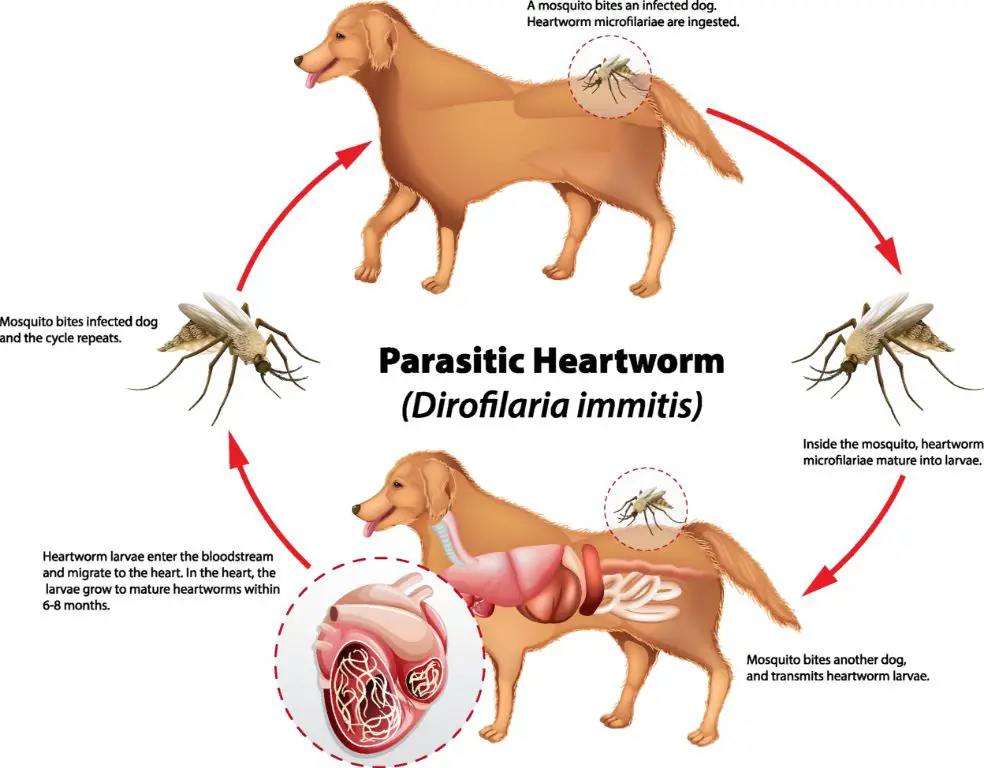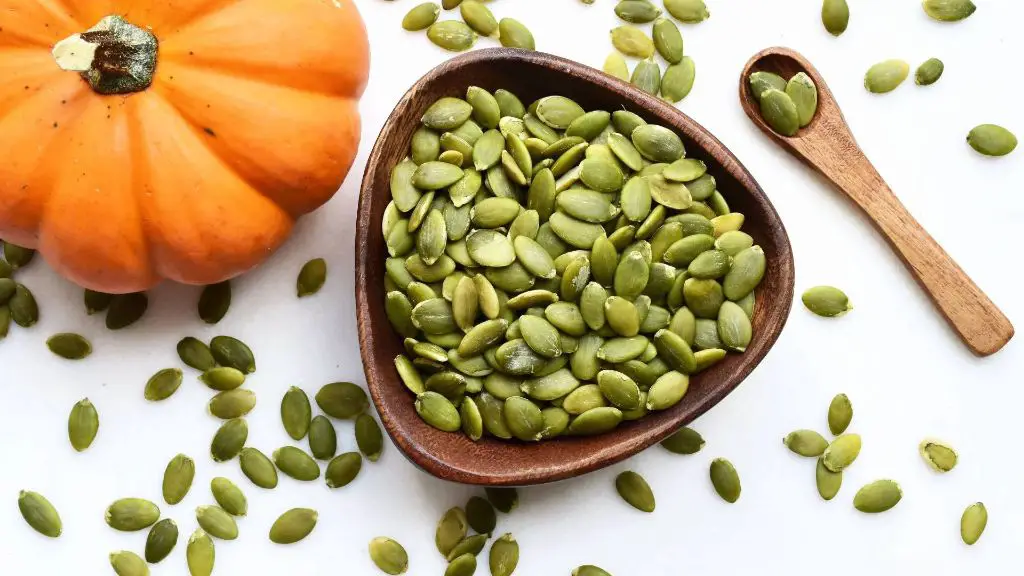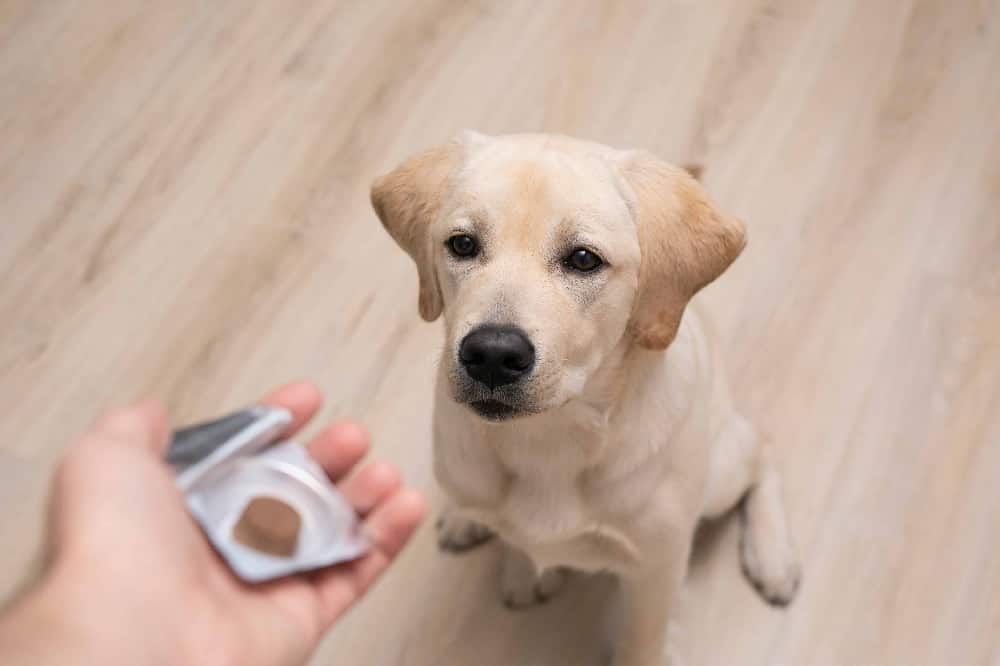What are Heartworms in Dogs?
Heartworms are parasitic roundworms that infect dogs and other mammals. They are called heartworms because the adult worms live in the heart, lungs, and blood vessels surrounding the heart, where they can grow up to 12 inches long.
The heartworm life cycle begins when a mosquito bites an infected animal, ingesting microscopic larvae called microfilariae into its system. Inside the mosquito, the larvae develop into an infective stage over 8-30 days. If the infected mosquito then bites a dog, the larvae migrate under the dog’s skin and mature in about 70-120 days.
The larvae then circulate in the bloodstream until they reach the heart and blood vessels around the lungs, where they grow into adult worms at around 6-7 months of age. The adult female heartworm can lay new microfilariae that can infect other mosquitoes, spreading the cycle further.
As the worms populate the organs, they cause symptoms like coughing, lethargy, weight loss and fatigue. In later stages, symptoms can progress to liver, kidney and lung damage, and even heart failure or death if not properly treated.
Conventional Heartworm Treatments

The conventional treatment prescribed by veterinarians for heartworm disease typically involves an arsenic-based medication called melarsomine. Vets administer a series of painful injections that kills the adult heartworms living in the dog’s blood vessels.
While melarsomine is effective at killing heartworms, the treatment process can be very hard on dogs. As the worms die, they break up into pieces that travel through the blood vessels and can cause blockages. This leads to severe inflammation and potential damage to the kidneys, lungs, and heart.
Dogs undergoing conventional heartworm treatment also require 30+ days of strict exercise restriction and confinement. Complications like blood clots and respiratory distress are common during recovery. Treatment can be especially risky for older dogs or those with underlying health issues.
Pumpkin Seeds as a Potential Remedy
Pumpkin seeds are sometimes claimed to help get rid of heartworms in dogs. The rationale is that pumpkin seeds contain compounds known as natural anthelmintics, which have activity against parasitic worms. Though they are traditionally used to treat intestinal worms and not specifically heartworms, pumpkin seeds may have an ability to paralyze and eliminate adult heartworms or help expel larvae, according to some anecdotal reports.
The supposed anthelmintic properties of pumpkin seeds come from compounds cucurbitacins and oleic acids. Cucurbitacins paralyze worms so they detach from the intestines and can be expelled, while oleic acids also have antiparasitic effects according to a few studies. However, neither the effects of these specific compounds on heartworms, nor pumpkin seeds themselves, have been scientifically studied yet. The rationale is mostly theoretical based on their effects on other intestinal parasites, with anecdotal evidence they may work for heartworms too. Still, heartworms specifically have not been thoroughly studied with pumpkin seeds or their compounds.
Studies on Pumpkin Seeds and Heartworms
There are currently no published scientific studies that specifically examine the efficacy of pumpkin seeds for treating or preventing heartworm infections in dogs. However, given the lack of research, claims about pumpkin seeds curing heartworm should be viewed with skepticism.
A few studies have looked at the effects of extracts from pumpkin seed, or cucurbitin compounds, on parasitic worms. One study found a pumpkin seed extract showed anti-parasitic activity against tapeworms in rats (1). Another study found cucurbitin extracted from pumpkin seeds demonstrated some ability to paralyze worms in a laboratory setting (2).
However, these limited studies were done on different types of parasitic worms, not specifically heartworms. And they tested pumpkin seed extracts under laboratory conditions, not giving whole pumpkin seeds to infected animals. Much more research would be needed to determine if whole pumpkin seeds have any meaningful impact on heartworm infections.
So in summary – there is currently no good scientific evidence suggesting pumpkin seeds can eliminate heartworm infection or be used as an alternative treatment.
Studies on Pumpkin Seed Extracts

There are some studies that have looked at compounds derived from pumpkin seeds called cucurbitins and their effects against parasites. However, these were not conducted specifically on treating heartworms in dogs. Rather, they were in vitro (lab-based) studies testing effects against various types of parasitic worms in other animals.
One study found that a cucurbitin compound called 23,24-dihydrocucurbitacin D had effects against parasites like tapeworms and roundworms. However, the dose used was very high and not practical for dogs. More research is needed, ideally in vivo studies in dogs with heartworms to determine true efficacy and proper dosing.
Overall there is insufficient evidence to support using pumpkin seed extracts like cucurbitins to eliminate heartworm infections in dogs at this time. More targeted research is required before this could be recommended as a heartworm treatment. Talk to your vet before giving your dog any kind of supplement, especially in place of conventional medication.
Anecdotal Evidence
There are several anecdotal claims online about dogs being cured of heartworms using pumpkin seeds or pumpkin seed extracts. Many people report giving their dogs a mixture of ground pumpkin seeds and carrots or other vegetables, and claim this natural remedy eliminated the heartworm infection. However, these reports are unverified and do not constitute scientific evidence. Without controlled studies, it’s impossible to confirm whether pumpkin seeds were truly responsible for curing heartworms in these cases. There may have been other factors involved, or it’s possible the dogs did not actually have heartworm infections to begin with. While some believe pumpkin seeds have anti-parasitic properties, anecdotal claims alone are not enough to support using pumpkin seeds as a heartworm treatment instead of proven preventative medication prescribed by a veterinarian.
Other Natural Heartworm Remedies
While there is limited evidence that pumpkin seeds can eliminate heartworms, there are some other natural remedies for heartworms that have been explored. This includes herbs such as black walnut hulls, wormwood, clove, and black haw, which have traditionally been used for deworming purposes. Some holistic veterinarians may also recommend a mix of supplements like garlic, Vitamin C, zinc, and omega-3 fatty acids to help support the immune system when battling heartworms.

However, very few formal studies have been conducted on these alternative heartworm remedies. Most evidence is anecdotal, passed down over generations of dog owners and holistic vets. While these remedies may provide immune support, there is no proof they actually kill, prevent, or eliminate heartworms in dogs. As with any significant health issue in pets, it’s important to talk to your vet before attempting to treat heartworms with home remedies alone.
Risks and Safety Considerations
While pumpkin seeds may have some anti-parasitic properties, relying solely on pumpkin seeds to treat or prevent heartworms comes with risks. Skipping regular veterinary checkups or proven medical treatments like heartworm preventatives opens dogs up to potentially irreversible damage from a heartworm infection.
Some risks of only using pumpkin seeds include:
- Allowing an existing heartworm infection to progress and cause lung disease, heart failure, organ damage, or even death
- Failing to detect a new heartworm infection before permanent damage is done
- Not protecting against infection from additional heartworm larvae
Ultimately, pumpkin seeds should never replace veterinary guidance or proven medical treatments. While some initial research shows promise for pumpkin seeds as a supplement to conventional care, relying on them alone risks serious harm. Dog owners should follow their vet’s advice on heartworm testing and prevention medications.
The Verdict
Based on available research, there is currently no clear evidence that pumpkin seeds can get rid of or prevent heartworm infections in dogs. Most studies have examined pumpkin seed extracts, rather than whole pumpkin seeds, and even these have shown mixed results against heartworms.
While a few anecdotal reports suggest pumpkin seeds may provide some benefits, there is no scientific proof they are an effective treatment on their own. More research is still needed before pumpkin seeds can be recommended to treat heartworms.
Instead of replacing conventional heartworm medications, pumpkin seeds may be better used as a supplemental aid alongside other treatments. But always consult your veterinarian first, as natural remedies can have side effects and may interfere with other medications.
Talk to Your Vet
While pumpkin seeds may show some promise as a supplemental aid for heartworm prevention, they should not replace conventional heartworm medication prescribed by your veterinarian. Before giving your dog any new supplement or remedy — natural or otherwise — it’s essential that you consult your vet first.
Your vet knows your dog’s unique health history and can advise if pumpkin seeds may interact with any medications or conditions. They can also run tests to confirm if your dog has an active heartworm infection or not. Depending on the results, they may recommend sticking with proven preventative medication alongside any supplemental aids.

Every dog is different, so work with your vet to determine the best heartworm prevention plan for your pet. Pumpkin seeds may offer additional support, but should not replace your vet’s guidance. By partnering with your vet, you can feel confident knowing your dog receives the most effective care.